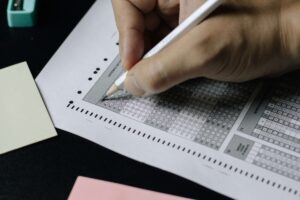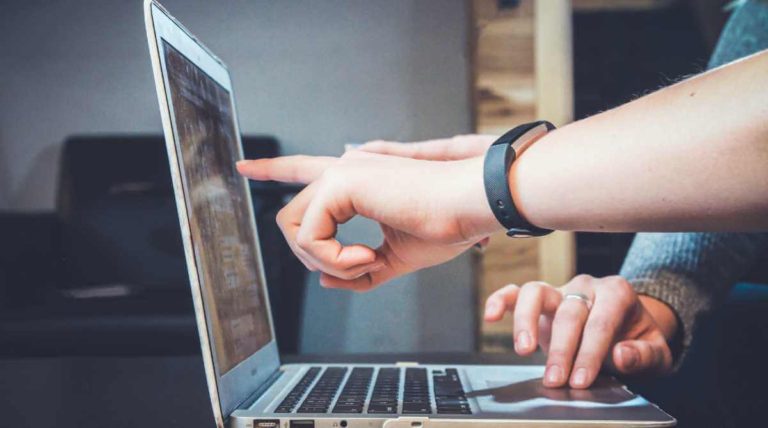
Tags: Online Bar Exam Covid
Tags: Online Bar Exam Covid
COVID-19 continues to disrupt the world, but law students are beginning to see the end of the Bar Exam with the NY Bar Exam scheduled for October 5-6. This year has been draining for many and now is the time for the final countdown. Here’s what to expect this year.

Photo, John Schnobrich, Unsplash
(1) ExamID
New York and 17 other states are preparing for early October tests. Most of those states have moved their tests online because of the pandemic, rejecting the idea of a diploma privilege. So as students are about to seat for the exam, they will first have to smile for the camera.
California, Connecticut, Massachusetts, New York, Ohio, Tennessee, and Vermont are among the states that will use facial recognition technology to confirm test takers’ identities. The technology flags differences in appearance between a test taker’s image and a previously recorded baseline image.
ExamSoft, which is the platform for administering Bar Exams, explains that the face scan will prevent unauthorized exam access and get documented evidence of any attempt at student impersonation
This has raised concerns, however, about discrimination as similar technology have struggled in the past to accurately read the faces of women and people of color. It has also raised questions about privacy, related to how images are stored and used, and accessibility.
More information on the ExamID feature here.

(2) ExamMonitor
The second issue with a remote bar exam concerns remote proctoring: how can we ensure students won’t cheat? Examsoft came up with ‘ExamMonitor’, which is a AI-driven remote proctoring solution that continuously observes exam takers with video and audio monitoring throughout the entire exam.
No WiFi connection is required during the exam however. The recording is captured locally on the exam taker’s device. (WiFi is only necessary to start the exam and to upload the final recording once the exam has been completed.) This eliminates WiFi connectivity issues as a possible point of failure in the remote proctoring process.
Remote test takers are bound by codes of conduct, similar to those for those taking the exam in person. They must stay in the frame of the camera during the entire test, and are typically not allowed to have anything but water at their workstations.
Once the exam is completed, the exam footage is uploaded to ExamSoft and analyzed and reviewed by a proctor. An AI system analyzes the audio and video recording and identifies any abnormalities in student behavior based on movement, gaze, and background noise.
But here again, applicants are concerned about bout giving their biometric data to test-taking software companies. These facial recognition tools will capture “a lot of information inside the home” that could put people’s livelihoods at risk, said Faiza Patel, co-director of the Brennan Center’s Liberty & National Security Program.
More information on ExamMonitor feature here.

Many would-be lawyers have said they’re grateful to avoid the health risks that come with taking an in-person test, yet the online tests also present a range of significant issues, adding another layer of stress.
Among privacy concerns raised earlier, is the risk of technical glitches or breakdowns that have occurred in each of the individual states that have attempted to hold an online bar to date.
The Michigan Bar Exam was hailed as the nation’s first online bar exam but was also the first online bar exam to crash, a mishap the manufacturer blamed on a cyberattack.
John Nevin, spokesman for the Michigan Supreme Court, said 773 law school graduates were taking the online bar exam manufactured by ExamSoft Worldwide Inc. when they got locked out at the beginning of the second module of the five-module test due to a cyber attack.
The issue was resolved soon after, Nevin said: 200 students were back in the system within 10 minutes, while the others could access the exam in 37 minutes.
On Aug. 5 ExamSoft in a Tweet described the problem as a “DDOS cyberattack,” and stated that it had requested an official investigation from the FBI and the U.S. Department of Homeland Security.
Facing those concerns, the New York Board of Law Examiners says the state’s online bar exam will be ok, takes those concerns seriously.
A frequently asked questions list released by the agency in August also mandates that test takers sit for at least two mock exams before the actual test on Oct. 5-6, to make sure they understand the technology. Test takers also will need to learn how to use virtual “notes” instead of regular scrap paper, and meet strict deadlines to register their computers with the exam provider.
Footage then will be reviewed by at least one human proctor, said the FAQ, in part so that everyday sounds like barking dogs or street sirens, which might be initially flagged by AI, can be disregarded as unsuspicious on review. BOLE says it anticipates most flags will be cleared by human proctors.
Judy Gundersen is president and CEO of the National Conference of Bar Examiners, which devises exam content and works with states on test administration. She believes the states and vendors will be able to work out any potential issues before early October.
“I have confidence in the administrators who are working night and day” to ensure successful exams, she said. “Everyone is going into this with their eyes wide open.”
Home » Online Bar Exam: ‘Eyes Open’ with Face Recognition and AI technology
MORE FROM THE INTERNATIONAL LAWYER
SUBSCRIBE NOW
![Examen de l'article 100 - Fiches de révision [PACKAGE] (2025)](https://theinternationallawyer.org/wp-content/uploads/2022/10/Article-100-fiches-révision-1-300x457.png)

MORE FROM THE INTERNATIONAL LAWYER
SUBSCRIBE NOW
SUBSCRIBE NOW
A Legal Website - News, Insights and Opinions on Law School, the Bar Exam, and Careers for Law Students.
Contact us: [email protected]


